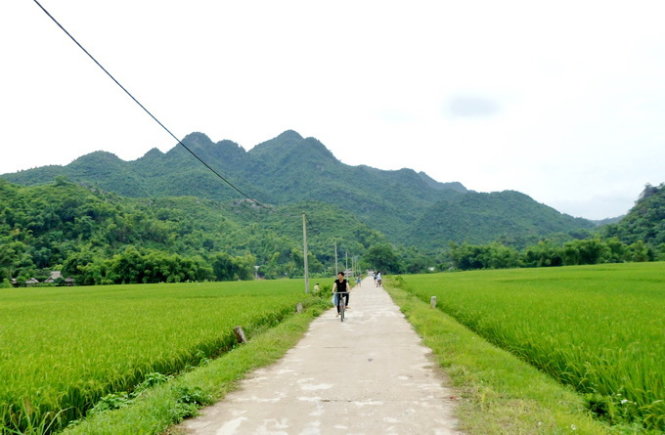If you are planning to take a trip to northern Vietnam, why not spend a homestay holiday in a town which boasts astounding landscape, an idyllic lifestyle and ethnic cultural features?
>> An audio version of the story is available here In recent years, Mai Chau District, located in the northern province of Hoa Binh, has emerged as an increasingly popular tourist attraction.
Less than 140 kilometers northwest of Hanoi, the heart of the district is home to a number of comfy hotels.
However, most visitors to Mai Chau, particularly Western and local backpackers and thrill seekers, find homestays with natives considerably more rewarding than spending their time in a hotel room.
Lac and Poom Coong Villages, which are a mere 15-minute walk from each other, are the most popular homestay spots.
Lac Village, which is bustling with restaurants and offers a wide range of tourist services, is the top choice among fun-lovers, students and tourists who come in groups.

Part of the tranquil Lac Village at dawn. Photo: Tuoi Tre
A newcomer when it comes to tourism activities, Poom Coong Village boasts tranquil charms and is thus perfect for loners who relish time spent away from the everyday hustle and bustle. Many choose to spend their homestays in both the villages so as not to miss any of the delights they have to offer.
A homestay spent at either village introduces visitors to the Thai ethnic minority's iconic architecture and lifestyle.

The idyllic landscape in Mai Chau District. Photo: Tuoi Tre
A Tuoi Tre (Youth) newspaper contributor shared her excitement when she first entered a stilt house built wholly with natural materials by the people.
Thai stilt houses are generally built higher than those by other ethnic communities, with the floor some two meters from the ground.
The houses usually boast three to five spacious chambers, while motorbikes and working tools are stored underneath.
This is also where the women weave their brocades and raise their poultry.
The houses are entirely built from wood, while their roofs are covered with thatch, and their floors are tiled with finely split bamboo poles.
They are thus drafty in the summertime and snug in wintry weather.

A traditional stilt house which offers homestay services in Mai Chau District. Photo: Tuoi Tre

Inside a stilt house built by Thai ethnic minority people from wood, bamboo and thatch. Photo: Tuoi Tre
The Tuoi Tre contributor was most delighted by the crackling sound every time she stepped on the bamboo floor.
She also relished the feeling when she was lying on the mattress inside the stilt house, looking up at the weather-beaten thatched roof.
Visitors are usually awoken early in the morning to the grunting of cattle and the noises produced by the farmers getting ready for a day’s work.
Though having their sleep disrupted in the wee hours, most homestay visitors are not vexed. Instead they are happy to be in for a stunning, tranquil dawn.
Another highlight during the stay is learning how to weave brocades from the Thai women.
Most families own a loom, on which they work in the morning or afternoon to create scarves and other clothing items.
Scarves, each of which takes three days to weave and costs only VND30,000-40,000 (US$1.5-2), make great souvenirs for tourists.
During her recent trip, the Tuoi Tre contributor was also told that a young American female had bought a loom and had it transported to Hanoi before asking the loom’s owner, who is a local artisan, to go to the capital and teach her how to weave brocades for one month.

A tourist (right) excitedly learns how to weave on the loom at a brocade shop in Mai Chau. Photo: Tuoi Tre
It is also highly recommended that homestay holidaymakers at Lac and Poom Coong Villages rent bicycles and ride them while sightseeing the picturesque paddy fields and resplendent mountains.
Most households here lease bicycles to tourists for only one or two dollars a day.
Tourists can go for rides within the two villages or beyond.

A tourist explores Mai Chau on her bike. Photo: Tuoi Tre
The paddy fields are at their best around late April and late October when they are ripe, creating gorgeous spectacles.
For a brief time before the harvesting season, which is also sought after by tourists and photographers, water is drained from the fields.
The paddy fields then turn into huge glittery mirrors for nature to admire itself in.

The seemingly endless paddy fields in Mai Chau are pictured in their prime time. Photo: Tuoi Tre

Paddy fields resemble huge shiny mirrors in Mai Chau. Photo: Tuoi Tre
Mai Chau has a clutch of delights to offer to tourists, no matter what season they arrive.
Other highlights include the iconic delicacy “com lam thit nuong” (special rice with grilled meat), “can” traditional wine and the signature “xoe” dance.

Tourists are seen relishing delicacies in Mai Chau and sip "can" traditional wine from thin pipes. Photo: Tuoi Tre
|
Mai Chau District is now easily accessible by road. Tourists can catch coaches to the district at Hanoi’s My Dinh Bus Station. Such coaches usually depart around 8:00 or 9:00 am, and reach Mai Chau Bus Station around midday. Tourists will reach Poom Coong and Lac Villages after a walk of one or two kilometers from the station. Travelers who come in large groups can contact the villages’ representatives who will send electric cars to pick them up at the station. |
Like us on Facebook or follow us on Twitter to get the latest news about Vietnam!




















































